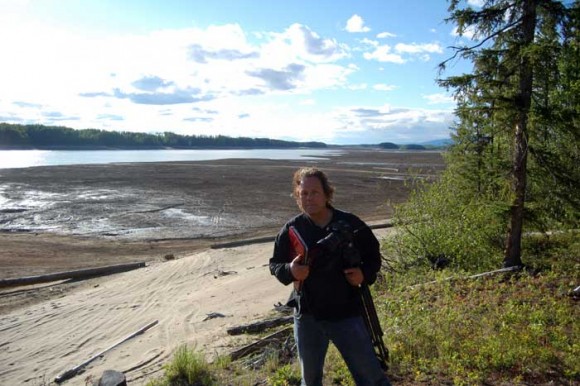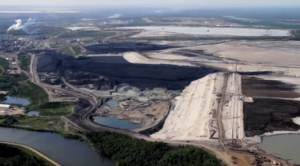GLOBAL VISIONS FILM REVIEW: Unfocused Peace Out fails to save Peace River
 Out here in conservative land, the Global Visions Film Festival is about as hippie-dippy-trippy as a film fest gets.
Out here in conservative land, the Global Visions Film Festival is about as hippie-dippy-trippy as a film fest gets.
But what is Global Visions all about? At its heart, the annual documentary festival, which runs at venues around the city for the next four days, is a celebration of the cerebral. Pretty much every documentary in the festival is steeped in a sense of humanism, all well-intentioned but with some decidedly off-the-mark entries as well.
The Global Visions Film Festival continues through Sunday at the Metro Cinema and other theatres. Here’s the first of selected reviews:
* * *
PEACE OUT – Directed by Charles Wilkinson, Canada, 80 minutes, Metro Cinema, March 1, 7:30 p.m. – Named Most Popular Canadian Documentary at the 2011 Vancouver International Film Festival, this look at the struggle between energy and the environment in Peace River Country has good intentions, but is ultimately flawed due to the filmmaker’s approach, which doesn’t properly frame the film’s purpose until the last 20 minutes and provides few answers to the middle-ground not interested in hyperbolic arguments.
 Instead, it takes the very modern and largely useless approach of trading off quotes between polar opposites in a debate that has much room for compromise: how much of our environment are we willing to sacrifice to produce energy? Most of the time the film amounts to little more than a polemic debate between environmentalists and business people over damage to the peace country, in the short term, and the planet in the long term.
Instead, it takes the very modern and largely useless approach of trading off quotes between polar opposites in a debate that has much room for compromise: how much of our environment are we willing to sacrifice to produce energy? Most of the time the film amounts to little more than a polemic debate between environmentalists and business people over damage to the peace country, in the short term, and the planet in the long term.
Of course, life isn’t as black and white as saying “we can or we can’t.” It’s not at trite as filmmaker Charles Wilkinson’s suggestion that we’re willing to sacrifice the health of future generations so we can have another iPod. It’s not as simple as saying that “nuclear waste would be contained on site,” then playing spooky music, without discussing what “contained” even means.
In other words, pollution and energy production are broad, difficult issues to understand with respect to technological limitations, social development and environmental impacts . Without respecting that complexity and including those broad details, there’s not much point having the debate. The very reason a documentary like Charles Ferguson’s Inside Job, on the 2008 financial meltdown, worked is precisely why this one doesn’t do its job: it fails to take a forensic approach of breaking complex underlying subject material down so that it can be easily understood.
We can generally take it for granted that local people don’t want a nuclear power plant in their backyard. Living next to a potential problem is not, in and of itself, a qualification for judging the scale of that problem, or how to deal with it.
If the question is how much we consume as societies when we’re told it might harm others, spending so little of the film discussing that question seems underproductive.
Of course, the polemic approach betrays the filmmaker’s own bias. He presents interviews from both sides, but there’s no doubt throughout that he’s opposed to energy expansion. And there are plenty of injections of that bias throughout. Both science and business, for example, are presented as having entirely unified fronts, which isn’t true.
Having said all of this, human behaviour is largely an exercise in defending beliefs from which we deride the anxiety-reducing joy of group security, without ever having actually rationalized those beliefs. So if you’re already convinced mankind’s self-interest can now be exercised with such damaging power that the ecosystem – and, consequently, humanity – is utterly doomed without massive intervention right now, you may think this documentary is great. But social evolution, human progress, and our ability to pull ourselves back from the brink time and again suggests otherwise, that we never get to that point of doom, that society slowly moderates towards a compromise position. And maybe, in the defence of the pathologically fact-lacking early intervener, that’s because of people who care enough start yelling the ol’ metaphorical “fire!” before the smouldering planter actually bursts into flames and takes out the porch.
The real value in Peace Out comes in focusing on the potential loss of the upper Peace River valley in B.C. to flooding due to damming. To the filmmaker, that’s just one element of a larger “ecological nightmare.” But the real humanity in the film – the loss of people’s farms and of the sheer beauty of the valley to produce power for people thousands of miles away, much of which might just be sold to the U.S. – unfortunately only gets about 30 minutes of time. That’s the film’s greatest flaw: in trying to excite broad outrage to multiple environmental causes, it diffuses its impact to the point of being hyperbolic. It’s a film that will largely only be seen as effective or convincing by those already converted.
Had it focussed singularly on the destruction of that valley for the dam, the loss of nature and life and beauty inherent to that decision? Well, it might have stopped it from happening. And that would sure beat the hell out of preaching to the converted.
(More Global Vision film reviews to come.)











